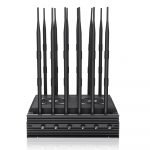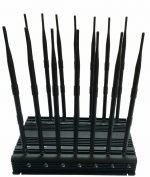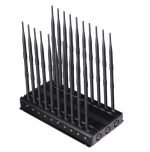Is a Cell Phone Jammer For the Workplace Necessary?

If you are an office worker, you may be thinking about installing a cell phone jammer for your workplace. This device turns off cellular signals, and it won’t allow your colleagues or customers to call or text you. To get started, read about the different types of jammers and their effects on cellular reception. You will also learn about the cost of installing such a device. You’ll be glad you did.
Locations where a cell phone jammer is needed
Cell phone towers are responsible for distributing the burden of phone usage across areas. Cell phone jammers block the signals from reaching specific areas and therefore prevent cellular signals from being transmitted. A cell phone jammer works by generating a fake signal with the same frequency as a cell phone. The jammer’s signal is so powerful that it can overwhelm a cell phone signal. Besides preventing cell phone signals from being transmitted, jammers also prevent the reception of calls made through the phone.
In some cases, a signal jammer can cause a blacked-out circle on the screen. This could be due to faulty equipment. For example, the new machinery on one edge might be casting a shadow of a nearby tower. In other cases, the blacked-out area could be the shadow of a local tower. Therefore, it is recommended that the jammer be installed in places where people cannot be disturbed by cell phone conversations.
Types of cell phone jammers
Cell phone jammers are devices that block the signal of mobile phones. These devices operate in the 800-2100 MHz frequency range, which covers GSM and DCS. However, cell phones can often evade the signal. This is due to many factors, including location of the cellular base station, terrain, topology, climate, building materials and construction, and communication system technology. Jamming devices can also be ineffective in certain places if they are not configured properly.
There are two primary types of mobile phone jammers. Portable ones are small enough to fit in a pocket, but are ineffective against signals that travel further than a few hundred meters. Desktop models are larger and can jam specific signals. If you’re looking for a portable unit, you’ll want to consider the features you need. Some portable jammers only jam specific signals. You can also purchase desktop jammers to block the signals of specific cell phone carriers.
Impact of a cell phone jammer on cellular reception
If you have been wondering what an impact a cell phone jammer has on the cellular reception at your workplace, here’s some information that will help you decide if one is necessary. First of all, the effect of cell phone jammers is often not so noticeable. The signals from cell phones are not so weak that they will interfere with a conversation, but a strong jammer can prevent that from happening.
A cell phone jammer works by blocking the signal from a nearby cell phone base station. The resulting interference disrupts the signal and causes the phone to not function properly. Because this type of device works by blocking the downlink signal, it can interfere with calls from other phones in the area. If the jammer is effective, a phone will stop showing any signal bars. As a result, workers in an office with a cell phone jammer will not be able to make calls while at work.
Cost of a cell phone jammer
While the cost of a cell phone jammer for workplace may seem high, it is actually quite reasonable. Most people don’t realize that cellphone carriers pay billions of dollars to lease spectrum from the government. These leases are made with the understanding that no other phone users will interfere with them. For example, Verizon Wireless spends about $6.5 billion per year to build its network and maintain it. A cell phone jammer costs as little as $200.
Although illegal GPS and cellphone jammers are a growing problem, they can also keep company vehicles from being tracked. A recent case involving a New Jersey company has led to a $32,000 fine for the man who allegedly jammed the system. The FCC began investigating after the global positioning system in Newark shut off without warning. The fine is a direct result of his actions, but it could have been much worse.








